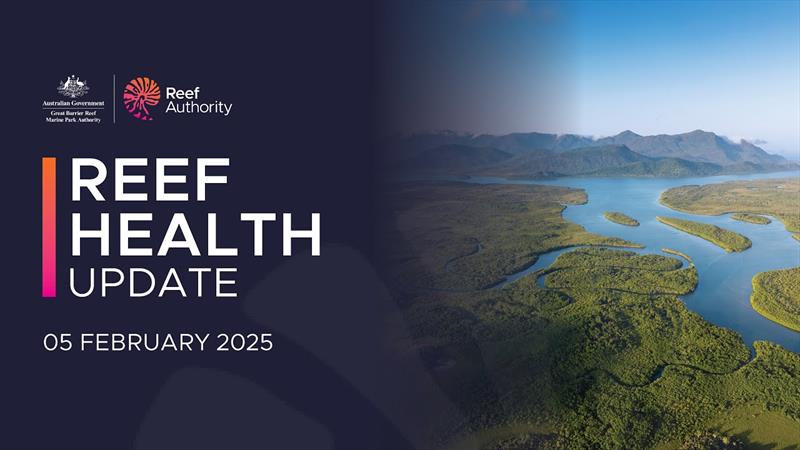
Great Barrier Reef health update
by Great Barrier Reef Marine Park Authority 6 Feb 03:19 UTC

Reef Health update | 05 February 2025 © Great Barrier Reef Marine Park Authority
As the lead managers of the Great Barrier Reef, the Reef Authority keeps an eye on the Reef year-round — with efforts stepped up over summer, a typically high-risk period from extreme weather.
The Reef Authority releases updates on the health of Reef which includes; sea surface temperatures, rainfall and floods, cyclones, crown-of-thorns starfish outbreaks, and coral disease.
These updates are based on forecasts, water temperature heat mapping, in-water surveys, citizen science and aerial surveys.
Reef Health update | 05 February 2025
The heavy rainfall across north Queensland has caused major flooding in some parts, which has severely impacted local communities - our thoughts are with you all.
The severe weather system has generated heavy rainfall, cloud cover and wind, which may provide some cooling benefits across much of the Marine Park. Flooding and resulting freshwater intrusion into the Marine Park may impact seagrass meadows and cause coral bleaching on some inshore coral reefs. This will be monitored using our extended network of partners undertaking standard assessments and reactive surveys.
Temperatures
Heat stress has continued to accumulate across the Reef, with Far North and Northern regions of the Great Barrier Reef exposed to above average sea surface temperatures for longer than the Central and Southern regions. Forecasts indicate sea surface temperatures may reduce over the next week, especially in the Northern and Far Northern regions as a result of the tropical low, however temperatures are still expected to exceed monthly averages by 0.5 to 1 degree Celsius.
Air temperatures have eased in the Great Barrier Reef catchments following the development and movement of the low-pressure system.
Rainfall
Very significant rainfalls have occurred over the catchment due to the slow-moving nature of the tropical low and monsoon trough over north Queensland.
Over the next three months, rainfall is likely to be above average across much of northern and eastern Australia, with the likelihood of above average rainfall exceeding 80% in parts of northern and central Queensland.
Reef health
Sixty-three Reef Health Impact Surveys (RHIS) were conducted across 10 reefs in the Marine Park over the past fortnight. These surveys recorded a low prevalence of coral bleaching, mostly in the Central region.
The Marine Monitoring Program is reviewing its flood response in the Mackay-Whitsundays, Burdekin, and Wet Tropics regions due to the recent heavy rainfall. While road closures are currently impacting access to sampling sites, the team is ready to conduct surveys once it is safe to do so. Satellite imagery will be continually reviewed to measure the extent and exposure of flood plumes entering the Marine Park.
Crown-of-thorns starfish outbreaks are present in the Southern Region (Swain Reefs) and the Northern 'initiation zone' (Port Douglas to Lizard Island), with isolated outbreaks near Townsville and the Whitsundays.
The Crown-of-thorns Starfish Control Program is prioritising reducing spawning populations in the "initiation zone" to prevent further spread of this coral-eating species, with concern the increasing population in this area may trigger waves of secondary outbreaks.
Reef management
As the lead managers of the Reef, we are working closely with our partners to monitor conditions across the Marine Park during these high-risk summer months.
We also use a range of management actions to support and build Reef resilience, including enforcing compliance with our zoning plan and ensuring people enjoy the Reef in a responsible way.
You too can help by reporting any incidents through the Eye on the Reef app, which is available for download on Google Play or Apple Store.